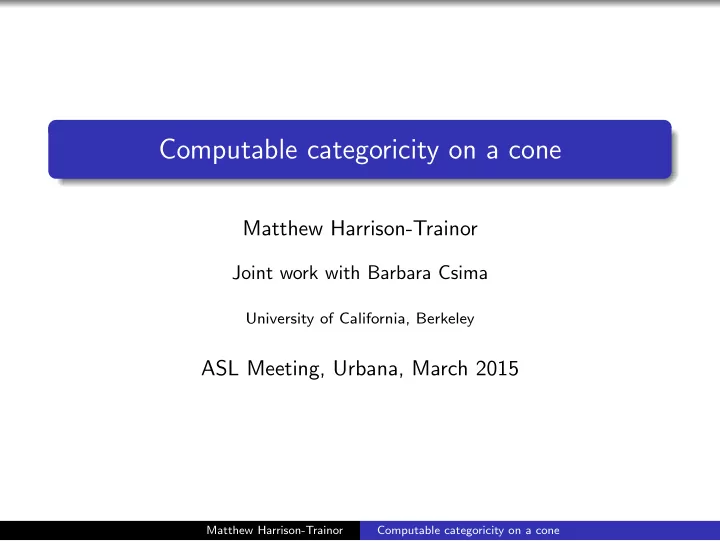

Computable categoricity on a cone Matthew Harrison-Trainor Joint work with Barbara Csima University of California, Berkeley ASL Meeting, Urbana, March 2015 Matthew Harrison-Trainor Computable categoricity on a cone
The main question / result Setting: A a computable structure. Suppose that A is a very “nice” structure. OR Consider behaviour on a cone. How hard is it to compute isomorphisms between different copies of A ? Main Result Natural structures have degree of categoricity 0 ( α ) for some α . Matthew Harrison-Trainor Computable categoricity on a cone
Degrees of categoricity Definition A is d -computably categorical if d computes an isomorphism between A and any computable copy of A . Definition A has degree of categoricity d if: (1) A is d -computably categorical and (2) if A is e -computably categorical, then e ≥ d . d is the least degree such that A is d -computably categorical. Example ( N , <) has degree of categoricity 0 ′ . Matthew Harrison-Trainor Computable categoricity on a cone
Which degrees are degrees of categoricity? Theorem (Fokina, Kalimullin, Miller; Csima, Franklin, Shore) If α is a computable ordinal then 0 ( α ) is a degree of categoricity. If α is a computable successor ordinal and d is d.c.e. in and above 0 ( α ) , then d is a degree of categoricity. Theorem (Anderson, Csima) (1) There is a Σ 0 2 degree d which is not a degree of categoricity. (2) Every non-computable hyperimmune-free degree is not a degree of categoricity. Question Which degrees are a degree of categoricity? Matthew Harrison-Trainor Computable categoricity on a cone
Strong degrees of categoricity Definition d is a strong degree of categoricity for A if (1) A is d -computably categorical and (2) there are computable copies A 1 and A 2 of A such every isomorphism f ∶ A 1 → A 2 computes d . Every known example of a degree of categoricity is a strong degree of categoricity. Question (Fokina, Kalimullin, Miller) Is every degree of categoricity a strong degree of categoricity? Matthew Harrison-Trainor Computable categoricity on a cone
Natural structures We will answer these questions for “natural structures.” A “natural structure” is a structure that one would expect to encounter in normal mathematical practice, such as ( ω, <) , Q , a vector space, or an algebraically closed field. Arguments involving natural structures tend to relativize. Matthew Harrison-Trainor Computable categoricity on a cone
Relative notions of categoricity Definition A is d -computably categorical relative to c if d computes an isomorphism between A and any c -computable copy of A . Definition A has degree of categoricity d relative to c if: 1 d ≥ c , 2 A is d -computably categorical relative to c and 3 if A is e -computably categorical relative to c , then e ≥ d . d is the least degree above c such that A is d -computably categorical relative to c . Matthew Harrison-Trainor Computable categoricity on a cone
Cones and Martin measure Definition The cone of Turing degrees above c is the set C c = { d ∶ d ≥ c } . Theorem (Martin, assuming AD) Every set of Turing degrees either contains a cone, or is disjoint from a cone. Think of sets containing a cone as “large” or “measure one” and sets not containing a cone as “small” or “measure zero.” Note that the intersection of countably many cones contains another cone. Matthew Harrison-Trainor Computable categoricity on a cone
Relativizing to a cone Suppose that P is a property that relativizes. Then property P holds on a cone if it holds relative to all degrees d on a cone. A natural structure has some property P if and only if it has property P on a cone. So we can study natural structures by studying all structure relative to a cone. Matthew Harrison-Trainor Computable categoricity on a cone
The main theorem Let A be a countable structure. Main Result Relative to a cone: A has strong degree of categoricity 0 ( α ) for some ordinal α . More precisely: Main Result (precisely stated) There is an ordinal α such that for all degrees c on a cone, A has strong degree of categoricity c ( α ) relative to c . α is the Scott rank of A . Matthew Harrison-Trainor Computable categoricity on a cone
Isomorphisms of c.e. degree On a cone: Theorem Suppose that A is ∆ 0 2 -categorical. Then for every copy B of A , there is a degree d c.e. in and above B such that: (1) every isomorphism between A and B computes d , and (2) d computes some isomorphism between A and B . Corollary Suppose that A is ∆ 0 2 -categorical and almost rigid. Then for every copy B of A , every isomorphism between A and B is of c.e. degree in and above B . Matthew Harrison-Trainor Computable categoricity on a cone
Recommend
More recommend